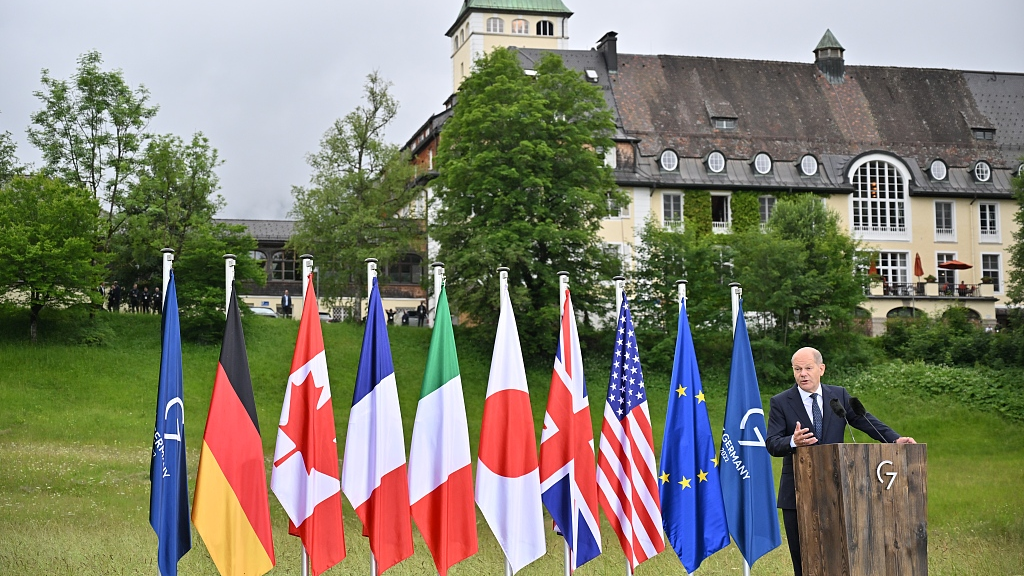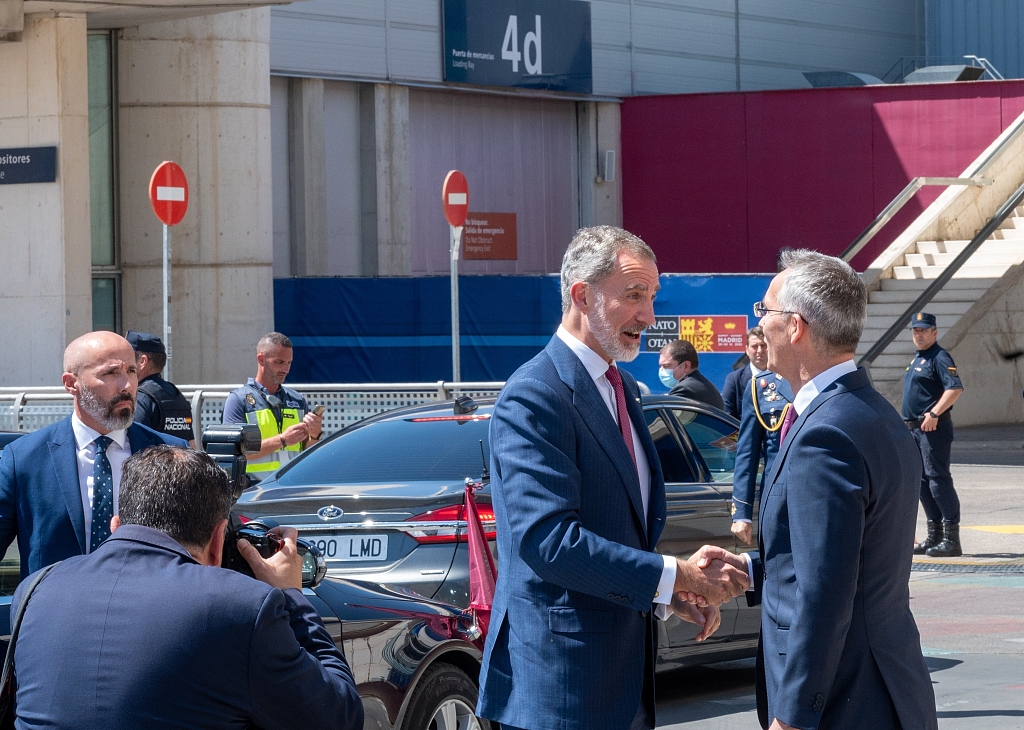
Olaf Scholz, German chancellor, addresses the closing news conference on the final day of the G7 leaders summit at the Schloss Elmau luxury hotel in Elmau, Germany, June 28, 2022. /CFP
Olaf Scholz, German chancellor, addresses the closing news conference on the final day of the G7 leaders summit at the Schloss Elmau luxury hotel in Elmau, Germany, June 28, 2022. /CFP
Editor's note: Anthony Moretti is an associate professor in the Department of Communication and Organizational Leadership at Robert Morris University. The article reflects the author's opinions and not necessarily those of CGTN.
The leaders of the supposedly free world continue to meet in Europe – first for the G7 and now for conversations about NATO. The positive spin and tough talk are guaranteed, but there already has been at least one awkward moment. Yet, as the economic and military conversations continue on, only one conclusion can be drawn: Western leaders assisted in creating the morass that is now in Ukraine, and they seem to have no firm solutions for solving the crisis.
A primary theme from this week is that the bloc is ready for even more warfare. Before the world leaders arrived in Spain, where the NATO talks are being held, NATO Secretary-General Jens Stoltenberg trumpeted that the military bloc would increase its rapid-reaction forces from 40,000 to 300,000. Why? To make sure Russian President Vladimir Putin understood that an attack on any NATO member would be met with overwhelming force.
The United States and a sizable portion of Europe is yet again banging their war drums. Not content with being a formidable factor in fomenting a mess in one country, the august body stands ever-ready to deliver its war-machine chaos elsewhere on the continent and beyond.
Stoltenberg was claiming Russia had forced NATO's hand, the G7 leaders were concluding their economic-focused meetings in Germany, and it was therefore confirmed that they would remain aligned with Ukraine "for as long as it takes."
One item that Western leaders are ignoring: The declining support throughout Europe for the war in Ukraine. The European Council on Foreign Relations (ECFR) recently noted that about one-third of Europeans wants "the war to end as soon as possible," while only 25 percent believes that continuing to punish Russia, recognizing that many of those sanctions have led to economic misery throughout the continent, is the right way to go. The ECFR reportedly concluded that there is "a growing gap between the stated positions of many European governments and the public mood in their countries."
Meanwhile, in the United States, the Quincy Institute for Responsible Statecraft reminded its readers of the war's not-so-secret's secret: the Central Intelligence Agency (CIA) is in Ukraine and assisting Kyiv in multiple ways. Building off a report in the New York Times, which noted the CIA was providing "stealthy logistics, training and intelligence support" to Ukraine, the Quincy Institute asked an important question: "Operational secrecy and security are no doubt the fig leaf, but when we're not supposed to be in a war we aren't supposed to be in a war, right?"
Yes, America, you are at war.
One must ask how soon will it be before the Europeans and Americans demand answers on questions such as: How did NATO precipitate this crisis by refusing to heed Russian warnings that inching closer and closer to its borders would end up with real consequences? Meanwhile, rising gas and food prices are not going away in the West. As the prices remain high and likely to get worse, the public's anxiety will continue to rise. Leaders should have more reasonable responses to prepare for.

NATO Secretary-General Jens Stoltenberg and Spain's King Felipe VI meet before NATO Leaders' Summit in Madrid, Spain, June 28, 2022. /CFP
NATO Secretary-General Jens Stoltenberg and Spain's King Felipe VI meet before NATO Leaders' Summit in Madrid, Spain, June 28, 2022. /CFP
The leaders who have gathered in Spain are saying nothing. But they are going to release a so-called, Strategic Concept. According to NATO, the document "is expected to make clear that Allies consider Russia as the most significant and direct threat to NATO's security, while addressing China for the first time and the challenges that Beijing poses toward Allied security, interests and values."
Of course an attempt to undermine China would take place. And you are not surprised, right?
Now about that awkward moment: British Prime Minister Boris Johnson drew laughs, although groans would have been more appropriate, at the outset of the G7 gathering when he asked his fellow leaders if they should strip for the group photo. According to the Washington Post, Johnson asked, "Jackets on? Jackets off? Shall we take our clothes off. ... We all have to show that we're tougher than Putin."
Canadian Prime Minister Justin Trudeau said the group would do "the bare-chested horseback riding display" to affirm their manliness. This gross display of "decorum" took place with one woman – European Commission President Ursula von der Leyen – at the table. Gentlemanly behavior, this was not.
The G7 leaders should have been spent more time examining what the likely expansion of the BRICS will mean to them. Brazil, Russia, India, China and South Africa make up that body, and it might welcome at least two other nations. Granted, the inclusion of Argentina and Iran would not make the BRICS more potent than the G7, but it would be an indication that China's Belt and Road Initiative and other efforts at establishing win-win economic partnerships are gathering more steam.
The positive responses to China's Global Development Initiative and Global Security Initiative provide additional evidence that the international community is seeking solutions to crises but not looking to the West for them.
(If you want to contribute and have specific expertise, please contact us at opinions@cgtn.com. Follow @thouse_opinions on Twitter to discover the latest commentaries in the CGTN Opinion Section.)

